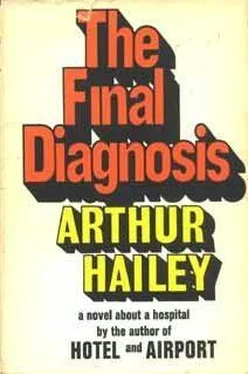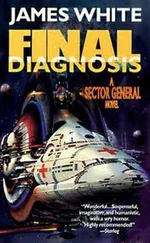Arthur Hailey - The Final Diagnosis
Здесь есть возможность читать онлайн «Arthur Hailey - The Final Diagnosis» весь текст электронной книги совершенно бесплатно (целиком полную версию без сокращений). В некоторых случаях можно слушать аудио, скачать через торрент в формате fb2 и присутствует краткое содержание. Жанр: Триллер, на английском языке. Описание произведения, (предисловие) а так же отзывы посетителей доступны на портале библиотеки ЛибКат.
- Название:The Final Diagnosis
- Автор:
- Жанр:
- Год:неизвестен
- ISBN:нет данных
- Рейтинг книги:4 / 5. Голосов: 1
-
Избранное:Добавить в избранное
- Отзывы:
-
Ваша оценка:
- 80
- 1
- 2
- 3
- 4
- 5
The Final Diagnosis: краткое содержание, описание и аннотация
Предлагаем к чтению аннотацию, описание, краткое содержание или предисловие (зависит от того, что написал сам автор книги «The Final Diagnosis»). Если вы не нашли необходимую информацию о книге — напишите в комментариях, мы постараемся отыскать её.
The Final Diagnosis — читать онлайн бесплатно полную книгу (весь текст) целиком
Ниже представлен текст книги, разбитый по страницам. Система сохранения места последней прочитанной страницы, позволяет с удобством читать онлайн бесплатно книгу «The Final Diagnosis», без необходимости каждый раз заново искать на чём Вы остановились. Поставьте закладку, и сможете в любой момент перейти на страницу, на которой закончили чтение.
Интервал:
Закладка:
Months before, with an architect at their elbows, the three had worked over the detailed plans for each section which would have its home in the new wing. The wishes of heads of medical departments had had to be balanced against the money likely to be available. Orden Brown had been the arbiter with O’Donnell as medical liaison. As always, the chairman had been crisp and incisive, but with a humor that seasoned his basic toughness. Sometimes they had gone along entirely with what was asked; at other times, when they suspected empire building for its own sake, the inquiries had been more searching.
One section head, the chief pharmacist, had pressed hard to have a private toilet included in his own office design. When the architect had pointed out that more general facilities were available a mere forty feet down the corridor, the pharmacist had gone so far as to observe that forty feet was a long way when he was suffering one of his periodic attacks of diarrhea. Orden Brown had dryly referred him to the department of internal medicine.
A few worth-while projects had had to be vetoed solely on the grounds of cost. Ding Dong Bell, the senior radiologist, had made out a convincing case for creation of a cine-radiography unit—its purpose to improve diagnosis and treatment of heart disease. But on learning that the equipment alone would cost fifty thousand dollars the plan had regretfully been ruled out.
But now, with the main planning completed, the focus of attention was on the practical matter of getting the money. Strictly speaking, this was the responsibility of the board of directors; but the medical staff was expected to help.
Orden Brown said, “We’re suggesting some quotas for the doctors—six thousand dollars for senior attending physicians, four thousand for associates, two thousand for assistants.”
O’Donnell whistled softly. He told the chairman, “I’m afraid there’ll be some complaining.”
Brown smiled. “We must do our best to endure it.”
Harry Tomaselli put in, “The money can be spread over four years, Kent. As long as we have written pledges we can use them to borrow from the bank.”
“There’s another thing,” Brown said. “When word gets around town that this is what the doctors themselves are giving, it will help our general fund raising a good deal.”
“And you’ll see that word does get around?”
Brown smiled. “Naturally.”
O’Donnell reflected that it would be his job to break the news at a medical staff meeting. He could visualize the pained expressions he would face. Most medical men he knew, like the majority of people nowadays, lived right up to their incomes. Of course, there would be no compulsion about the quotas, but it would be hard for an individual to take a stand against them, especially since the medical staff had a lot to gain from the hospital’s growth. A good many certainly would give the full amount asked and, human nature being what it was, they would bring pressure on others to suffer equally. A hospital was a breeding ground for politics, and there were many ways in which a nonconformist could have life made difficult for him.
Harry Tomaselli, intuitive as usual, said, “Don’t worry, Kent. I’ll brief you thoroughly before the staff meeting. We’ll have all the selling points lined up. In fact, when you’re through some people may even want to exceed quota.”
“Don’t count on it.” O’Donnell smiled. “You’re about to touch a number of doctors on their tenderest nerve—the pocketbook.”
Tomaselli grinned back. He knew that when the chief of surgery made his appeal to the staff it would be as incisive and thorough as everything else O’Donnell did. He reflected, not for the first time, how good it was to work with someone of O’Donnell’s character. In Tomaselli’s last hospital, where he had been assistant administrator, the president of the medical board had been a man who courted popularity and trimmed his sails to every wind of opinion. As a result there had been no real leadership and hospital standards had suffered accordingly.
Harry Tomaselli admired forthrightness and swift decisions, mostly because those were methods he used himself as administrator of Three Counties. With swift decisions you sometimes made mistakes, but on the whole you got a lot more done, and your average of hits unproved as time went on. Quickness—of speech and thought, as well as action—was something Harry Tomaselli had learned in courtrooms long before he ever thought of finding his destiny behind a hospital desk.
He had entered law school from college and bad begun to lay the foundations of a good practice when war intervened. Anticipating the draft, he had enlisted in the U.S. Navy where he had received a commission and a job in medical administration. Later, as the navy hospitals filled with wounded, Lieutenant Tomaselli had proven himself an able administrator with an instinct for sensing the invisible border line between the practice of medicine and the business of hospital management.
After the war, faced with the choice of returning to law or remaining in hospital work, he had chosen the latter and enrolled in the School of Hospital Administration at Columbia University. He had graduated from Columbia at a time when there was growing recognition of hospital administration as a specialized field of endeavor in which a medical degree was neither necessary nor particularly useful. This had opened up a brisk demand for good administrators, and after two years as an assistant he had accepted Orden Brown’s offer of the top post at Three Counties.
Now Harry Tomaselli was in love with his work. He shared Kent O’Donnell’s views about the standards of good medicine and respected the business acumen and caginess of the board chairman, Orden Brown. As administrator, it was Tomaselli’s business to see that all hospital services—nursing, housekeeping, engineering, building, accounting, and their subsidiaries—measured up to the standards the other two men required.
He did this by delegation—he had a happy faculty of appointing good department heads—and also by an intense personal interest in everything that went on within the hospital. Almost nothing of importance escaped Harry Tomaselli. Each day his short, stocky figure could be seen bustling along the corridors but pausing frequently while he talked with nurses, patients, janitors, clerks, cooks—anyone who could tell him something about the hospital or make a suggestion on how to run it better. New ideas excited him; his own enthusiasm engendered more in others. Sometimes, head thrust forward, eyes gleaming behind his big black-rimmed glasses, he would talk volubly, his thoughts moving at a gallop, his hands underscoring points as he made them.
In all his peregrinations Harry Tomaselli seldom made a written note. His lawyer’s training enabled him to carry assorted facts readily in his head. But after each inspection tour he fired off a barrage of staccato memoranda on all points, big and little, where he felt the administration of Three Counties could be improved.
Yet, for all this, he had a diplomat’s sense of tone and language that seldom gave offense. Verbally he would hand out a reprimand, then talk cheerfully of something else. And though he never wasted words, his written memos were always gracious. He hated to fire a hospital employee unless the provocation were really strong. He frequently told his department heads, “If anyone has worked here more than a month, we have an investment in their experience. It’s to our advantage to mold them if we can, rather than try for someone new who may have other faults we haven’t thought of.” Because this policy was known and respected, employee morale was high.
There were still things about the organization that worried him. Some departments, he knew, could be made more efficient. There were areas where service to patients could be improved. A good deal of old equipment needed junking and replacement. There was newly developed equipment—the cine-radiography unit was an example—which, under ideal conditions, the hospital should have. The new building program would make good some of these deficiencies but not all. Like O’Donnell, he knew there were years of work ahead and that some objectives perhaps would remain beyond reach. But, after all, that was the road to achievement; you always tried for a little more than you knew you could accomplish.
Читать дальшеИнтервал:
Закладка:
Похожие книги на «The Final Diagnosis»
Представляем Вашему вниманию похожие книги на «The Final Diagnosis» списком для выбора. Мы отобрали схожую по названию и смыслу литературу в надежде предоставить читателям больше вариантов отыскать новые, интересные, ещё непрочитанные произведения.
Обсуждение, отзывы о книге «The Final Diagnosis» и просто собственные мнения читателей. Оставьте ваши комментарии, напишите, что Вы думаете о произведении, его смысле или главных героях. Укажите что конкретно понравилось, а что нет, и почему Вы так считаете.












